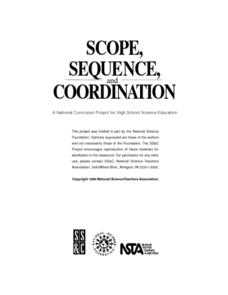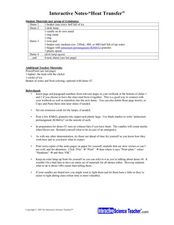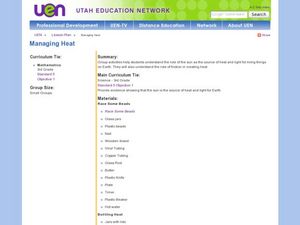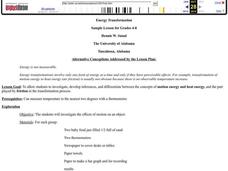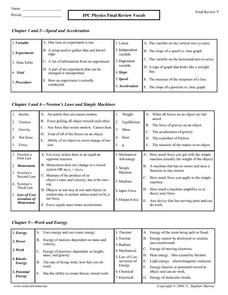Curated OER
Heat, Temperature, and Transfer
Physical science scholars discover an array of heat sources. They experiment to connect radiation to heat. They begin to understand thermal equilibrium. Then, they test to see if mass affects the rate of temperature change. Choose a few,...
Curated OER
Interactive Notes-"Heat Transfer"
Students explore heat transfer. In this temperature and molecule behavior lesson, students view a PowerPoint while simultaneously performing experiments in which heat transfer is demonstrated. Students use cold beakers, ice...
Curated OER
Design a Bobsled
Students apply their knowledge of friction, drag, mass and gravity as they design, build, and test mini-bobsleds.
Captain Planet Foundation
Solar Cooking Race
Study heat transfer with activities that focus on how heat energy works. Using a solar cooker, ice cubes, and heat transfer bracelets, kids experiment and record what they find by keeping ice cubes cold and vegetables hot.
Space Awareness
Let's Break the Particles
Build learning by breaking atoms! Young scientists study the way energy changes with a hands-on activity. As they roll steel marbles down a ramp, learners test the hypothesis that kinetic energy does not go away with friction...
Curated OER
Managing Heat
Third graders perform various experiments to show the flow of energy that causes heat. For this heat lesson, 3rd graders understand how heat is transferred or trapped. Students use the scientific method and critical thinking skills to...
Curated OER
Energy/Light/Heat/Sound
Fourth graders study the properties of heat in this series of lessons. They discuss sources of heat and experiment to determine its properties. They identify insulators and conductors by measuring temperatures, and graphing their data....
Curated OER
Motion Lotion
Students view a video to explain the meaning of friction. In a hands-on experiment using gelatin, students test the effects of lubrication on friction. They complete a worksheet imbedded in the activity to describe their observations.
Curated OER
Things Are Heating Up!
Third graders study how heat is produced from mechanical and electrical machines and human activities.
Curated OER
Energy Transformation
Students experiment with variety of materials to investigate, develop inferences, and differentiate between concepts of motion energy and heat energy, and the part played by friction in the transformation process.
Curated OER
Friction and Machines
Fifth graders experimentally determine the relationship of friction to the functioning of machines. They demonstrate that rollers can decrease frictional force and increase speed and research to discover other ways that friction can be...
Teach Engineering
Energy Skate Park
Skate through a simulation on energy with an a activity that uses a computer simulation of a skater to reinforce the concept of conservation of energy. The resource guides pupils through scenarios using the computer simulation to...
Curated OER
Applied Science - Physics Post-Lab
Young scholars investigate energy. In this Physics lesson, students explore different sources of energy: heat, nuclear, and chemical. Young scholars sing an electricity song.
Curated OER
Investigation 7 - Rubbing Objects Together
Third graders investigate rubbing two objects together to produce heat.
Curated OER
Slime!
Students participate in a science experiment in which they try and move gelatin cubes with and without a lubricant. They examine the concept of friction and resistance to motion.
Reach Out!
Paper Clip Sailing
Students explore water, molecules, and surface tension. In this floatation lesson, students discover why some objects are able to float on water as they follow the procedures included in this activity.
Curated OER
Ice Energy
Learners explore how chemicals change water. In this chemical change lesson, students participate in an experiment to observe how salt effects ice and how ice cream freezes.
Curated OER
Changing State
Learners investigate the cooling and heating of water. In this online science experiment lesson, students work in groups to make predictions regarding freezing and boiling points and then test those predictions as they complete the...
Curated OER
Air Pressure
Students investigate the basic principles of air pressure. In this experimental lesson students use materials to create several different experiments that help to explain air pressure and friction.
Curated OER
Circle of Pong
Students, in groups, use given materials to devise a way to deposit a ping-pong ball into a paper cup that is located in the middle of a 6-foot diameter circle, while standing outside the circle.
Curated OER
Free Up the Ketchup!
Students, in teams, use given materials and their knowledge of Newton's First Law to create a device that will remove a sticky ping pong ball from a 16-oz. cup (which represents ketchup stuck in a bottle.)
Curated OER
CO2 and Air Pollution
Seventh graders observe and test for the presence of carbon dioxide gas. They compare concentrations of carbon dioxide gas and conclude high concentrations of carbon dioxide gas are unhealthy for human beings.
Curated OER
IPC Physics Vocabulary Review
In this physics review worksheet, students review vocabulary words associated with speed, acceleration, Newton's Laws and simple machines, work and energy, magnetism, electricity, and harmonic motion and light. This worksheet has 92...
Reach Out!
Paper Clip Sailing
Students explain that some things can float on top of water because of what we call "surface tension." They see that if something happens to disturb these water molecules from tugging on each other, the skin-like surface breaks up.


